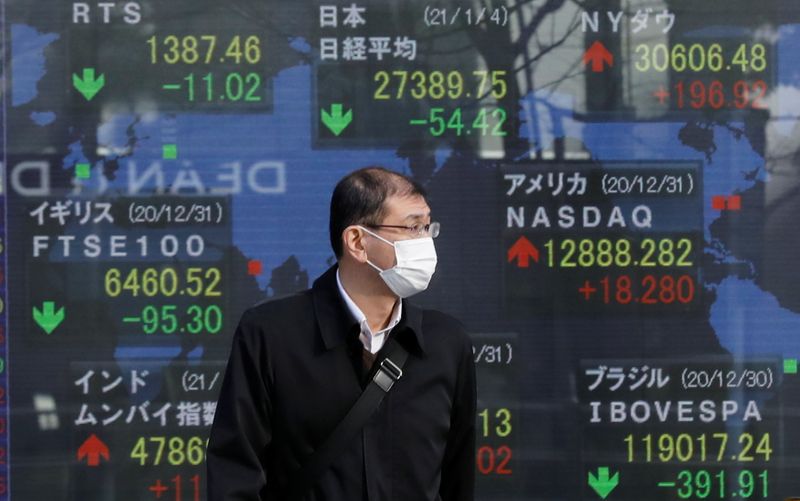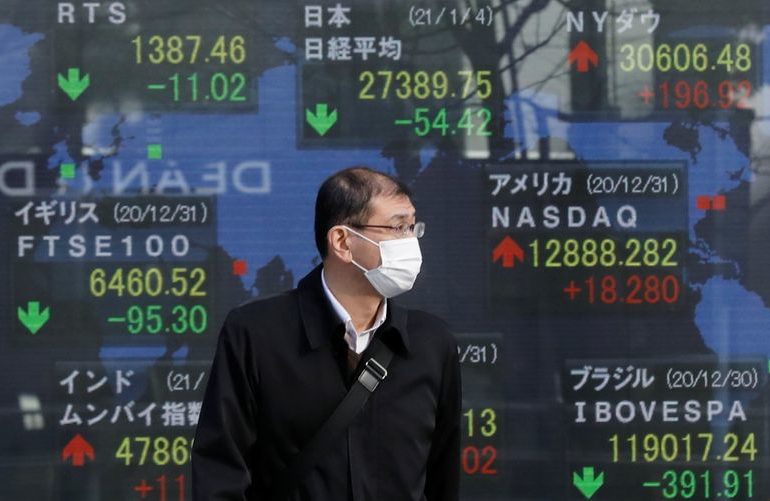 © Reuters. First trading day of stock market in Tokyo
© Reuters. First trading day of stock market in Tokyo
By Wayne Cole
SYDNEY (Reuters) -Asian share markets edged higher on Monday while oil prices slipped as the ship blocking the Suez Canal was re-floated, raising hopes the vital waterway could reopen and ease global shipping backlogs.
The news added to optimism about world growth as markets look to President Joe Biden to outline his infrastructure spending plans this week, which could supercharge an already accelerating U.S. recovery.
"We expect the global economy to expand robustly at 6.4% this year, fuelled by a large U.S. fiscal stimulus, with positive spillovers for the rest of the world," said Barclays (LON:BARC) economist Christian Keller.
"Rising inflation over the coming months should be transitory, and core central banks seem committed to looking through it."
MSCI's broadest index of Asia-Pacific shares outside Japan added 0.3%, with activity restrained by the approach of quarter end. Chinese blue chips rose 0.8%.
Japan's Nikkei gained 1%, though there was some nervousness when Nomura reported its U.S. unit could face a $2 billion loss related to a client.
There was also some caution after a $20 billion wave of block trades hit markets on Friday, reportedly linked to investment fund Archegos Capital.
For now, Nasdaq futures were off 0.6% and S&P 500 futures 0.5%. EUROSTOXX 50 futures did manage to rise 0.2%, while FTSE futures were flat.
The prospect of faster U.S. economic growth has spurred speculation of rising inflation and weighed on Treasury prices. Yields on U.S. 10-year notes eased a touch on Monday to 1.66%, but were still not far from the recent 13-month top of 1.754%.
European yields have been restrained by active buying from the European Central Bank, widening the dollar's yield advantage over the euro. The single currency was last at $1.1786, having hit a five-month low of $1.1760 last week.
Analysts at TD Securities noted the euro had failed to find any benefit from a very strong German IfO survey on Friday that showed business morale at a near two-year high and signs of recovery in the service sector.
"This suggests that market positioning still remains significantly skewed toward the long side in EURUSD — even though spot has seen a meaningful decline through the 200-day moving average," they wrote in a note. "We continue to focus on downside risks from here."
The dollar held at 109.50 yen, having reached its highest since early June on Friday at 109.84. The dollar index stood at 92.774, after reaching its highest since mid-November.
The lift in yields has weighed on gold, which offers no fixed return, and left it at $1,730 an ounce.
Oil prices eased as markets assumed the re-floating of the Ever Given would allow tankers to use the waterway again. There were over 300 vessels waiting to pass through the shipping route which accounts for 12% of global trade.
The market will also be cautious ahead of an OPEC meeting this week, which will have to decide whether to extend supply limits, or loosen the spigots. [O/R]
Brent fell 90 cents to $63.67 a barrel, while U.S. crude lost $1.03 to $59.94 per barrel.
Leave a comment
